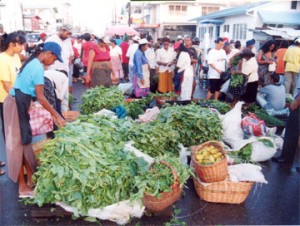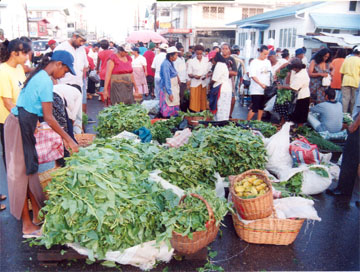Traders in Trinidad and Tobago hoping to meet the twin-island’s demand for fresh fruits and vegetables through imports from Guyana are encountering prices that are not competitive on the domestic market according to a report in the Daily Express.

An article published in the November 10th issue of the newspaper states that higher prices for Guyana’s fruit and vegetables on markets in the United States would mean that imports into the twin-island republic from Guyana “would cost no less than the inflated prices” currently paid there.
According to the Express the government in Port-of-Spain had recently advised local importers that twenty-six fruits and vegetables could be imported from Guyana at competitive prices. The items include tomatoes, hot peppers, pumpkin, mangoes, sweet potatoes, cabbage, bananas, peeled green coconut, rice, sweet pepper, limes, dried coconut, ginger, eddoes, bora, green plantains, rice bran and wiri wiri pepper.
The Express article quotes a Trinidadian trader who visited Guyana recently in the hope of importing fresh fruit and vegetables who contended that a market study has indicated that except for water melon which can be imported into Trinidad and Tobago from Guyana at around TT$2 per pound, hot peppers at TT$2.50 per bag, plantains at TT$5 per pound and eddoes at TT$4 per pound, the prices of other fruit and vegetables imported from Guyana were prohibitive. The Express quotes the trader as saying that the current purchase price for tomatoes was TT$9 and that by the time they arrived in Trinidad they would have to be sold at a retail market rate of between TT$15 and TT$18 per pound.
Current concerns over the size of the regional food import bill have focused the attention of the Caribbean on examining cheaper intra-regional sources of fruit and vegetables. At a regional conference on encouraging increased food production hosted by Guyana earlier this year Trinidad and Tobago mooted the idea of using Guyana’s land resources to invest in the development of mega-farms that could increase fruit and production and bring prices down.
However, some local traders have told this newspaper that regional buyers of Guyana’s fruit and vegetables who have been interfacing directly with local farmers have indeed had to pay higher prices as a result of increased seasonal demand in the United States.


